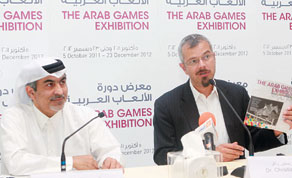 |
| Dr Wacker displays the catalogue of the Arab Games Exhibition as al-Mulla looks on |
The exhibition is an effort of the Qatar Olympic & Sports Museum (QOSM) at QMA, supported by its partners Qatar Olympic Committee and Egyptian Olympic Committee.
It will feature items including medals, posters, films and interviews of athletes, photographs and educational activities that inform visitors about the history of the Arab Games, which first took place in Alexandria, Egypt, in 1953.
QOSM director Dr Christian Wacker said yesterday that among the major exhibits are a replica of the very first Olympic flag, the lone surviving poster of the first Arab Games, and the first gold medals won by Qatari male and female athletes.
“The first Olympic flag, bearing the now iconic Olympic rings, was used in a regional competition – it was hoisted on April 5, 1914 at the first Pan-Egyptian Games in Alexandria,” he explained.
The original flag is in the International Olympic Committee (IOC) museum and QOSM has the only licence for a replica.
It was athlete Faraj Marzouk who won Qatar’s first gold medal in a multi-sport competition, when he triumphed in 100m in the Arab Games in Rabat 1985.
Qatar’s first gold from a female athlete came from Mahbubeh Akhlaghi in shooting in the Cairo Arab Games 2007.
“About 50% of the exhibits are from the Egyptian Olympic Committee, 20% from QOSM, and the rest from the IOC, other Olympic committees and from the athletes themselves,” Dr Wacker said.
After its Doha leg, the exhibition will travel to Egypt and other Arab countries.
The exhibition is divided into five sections, with the first depicting the political agenda behind the concept of the Arab Games.
This was followed by an era of Egyptian regional leadership. Subsequently, a period of decline affected the consistency of the Games from 1965 to 1985 because of political turmoil in several Arab countries.
A re-organisation of the Arab Games with a new vision later started to emerge, eventually leading to the transformation of the Arab Games into a world-class stage for Arab athletes to perform.
Arab Games Doha 2011 acting director (ceremonies) Abdulla Yousef al-Mulla thanked QMA chairperson HE Sheikha Mayassa bint Hamad al-Thani for the initiative.
“Qatar Museums Authority did everything from scratch for organising this exhibition as very little information was available,” he recalled.
Apart from highlighting the history of the Arab Games, the exhibition will also raise awareness among Qatari youth about the past achievements of the Arab world and inspire them.
A catalogue is available free of cost to all visitors to the exhibition. There will also be a merchandise booth featuring items from Arab Games Doha 2011 as well.
The Arab Games Exhibition will open from 8am to 12noon and 3pm to 9pm during weekdays, and from 3pm to 9pm on Fridays. Entry is free.

